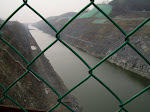11th December 2009
Dear President Lee Myung-Bak, Mr. Prime Minister Mr. Chung Un-chan, Chung Jong-hwan, Minister of Land, Transport and Maritime Affairs, and Mr. Lee Maanee, Minister of the Environment,
Re: Four Rivers Project, Republic of Korea (ROK)
The World Wetland Network (WWN), established at the Ramsar COP10 in Changwon, is a rapidly growing network of over 200 wetland Non-Government Organisations (NGOs) from across the world. A central committee of representatives from each continent, plus technical advisors, meets on a regular basis to plan, feedback and exchange information.
As a global network of wetland specialists, the WWN would like to advise the ROK government to cancel the Four Rivers Project.
In Europe, the US and Japan, there were numerous river engineering projects in past decades which included straightening river channels, dredging river beds, putting in built water management structures and re-enforcing banks. The world has since learnt from these mistakes. Disconnecting rivers from their flood plains, straightening and deepening them has led to huge problems with floods, erosion, poor water quality, changing ecological systems and reduced biodiversity, not to mention disconnecting local communities from their rivers. This of course also has an economic and human cost.
While the Four Rivers project in the ROK has been described as a ‘restoration’ project by its proponents, it is clear to the WWN and to all wetland experts around the world that the construction of new dams and river dredging cannot be called restoration. Further, the construction of bicycle trails and resort areas proposed as part of the Four Rivers project will increase disturbance to sensitive species and systems. As proposed, the Four Rivers project will lead to a massive loss of biodiversity and cause enormous environmental costs, some of which will be immediate, and others which will emerge longer-term as the rivers and watersheds can no longer function in a natural way.
The Four Rivers project, with its emphasis on construction is clearly contrary to the wise use principle that Ramsar promotes, and ignores existing Ramsar guidance on wetland restoration and management, environmental impact, and community involvement (e.g. resolution X.19: Wetlands and River Basin Management; VIII.16: Principles and guidelines for wetland restoration; resolution X.17: Environmental Impact Assessments; and resolution VII.8: Guidelines for establishing and strengthening local communities’ and indigenous people’s participation in the management of wetlands). In addition, it is clearly “unsustainable development” that will prevent the ROK from fulfilling its obligations to numerous international agreements, including Ramsar, the Millennium Development Goals and the Convention on Biological Diversity .
In contrast to the ROK Four Rivers project, in Europe, the Water Framework Directive is reversing these types of hard-engineering works, at great expense, to revert to a more naturally functioning, catchment-based approach. All member nations of the European Union have implemented the Water Framework Directive into their national policies. In the US, water companies now manage catchments to improve water quality, regulate flow naturally, and reduce the risk of flood. The WWN is happy to provide this information to decision-makers in the ROK, in order to assist the nation in its moves towards wetland conservation and wise use.
We therefore strongly urge the ROK to reconsider the Four Rivers Project. It is not too late to stop the destructive works, and to value your river systems as the natural treasures and providers that they are. It is not only in the interest of the ROK to do so, but also in the interest of all the nations of the East Asian - Australasian Flyway, and of all contracting parties to the Ramsar Convention.
Respectfully,
Chris Rostron, Chair of WWN
Melissa Marin, Neotropics Representative, WWN
Esteban Biamonte, Secretary, WWN
Peter Lengyel, Europe Representative, WWN
Baboucarr Mbye, Africa Representative, WWN
Cassie Price, Oceania Representative, WWN
Tsuji Atsuo, Asia Representative, WWN
Becky Abel, North America Representative, WWN
Kashiwagi Minoru, Technical Advisor, WWN
Luc Hoogenstein, Technical Advisor, WWN
www.worldwetnet.org
Shark's fin Import increased in South Korea
13 years ago
